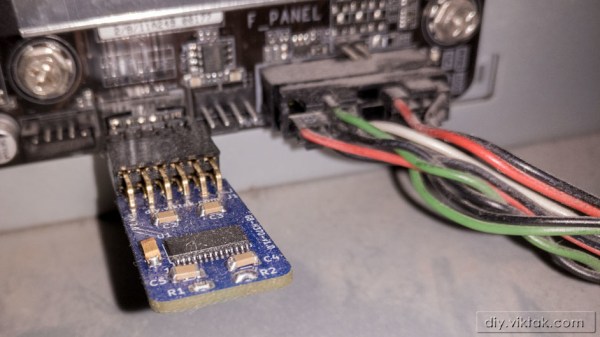Since Windows 11 has announced its TPM module requirement, the prices for previously abundant and underappreciated TPM add-on boards for PC motherboards have skyrocketed. We’ve been getting chips and soldering them onto boards of our own design, instead – and [viktor]’s project is one more example of that. [Viktor] has checked online marketplace listings for a TPM module for his Gigabyte AORUS GAMING 3 motherboard, and found out they started at around 150EUR – which is almost as much as the motherboard itself costs. So, as any self-respecting hacker, he went the DIY way, and it went with hardly a hitch.
Following the schematic from the datasheet, he quickly made a simple KiCad layout, matching it to the pinout from his motherboard’s user manual, then ordered the boards from PCBWay and SLB9665 chips from eBay. After both arrived, [viktor] assembled the boards, and found one small mistake – he designed a module for 2.54mm pin headers, but his motherboard had 2.0mm headers. He wired up a small adapter to make his assembled V1.0 boards work, and Windows 11 installed without any TPM complaints. He shows that he’s designed a new, V1.1 version with an updated connector, too, and published its (untested but should work) design files for us on GitHub. These modules can vary, by manufacturer and motherboard series, but with each module published, a bunch of hackers can save money – and get a weekend project virtually guaranteed to work out.
Regardless of whether the goal of running Windows 11 is ultimately worthwhile, it has been achieved. With scalpers preying on people who just want to use their hardware with a new OS, rolling your own TPM PCB is a very attractive solution! Last time we covered a DIY TPM module for ASrock server motherboards, we had a vivid discussion in the comments, and if you’re looking to create your own TPM board, you could do worse than checking them out for advice and insights!











